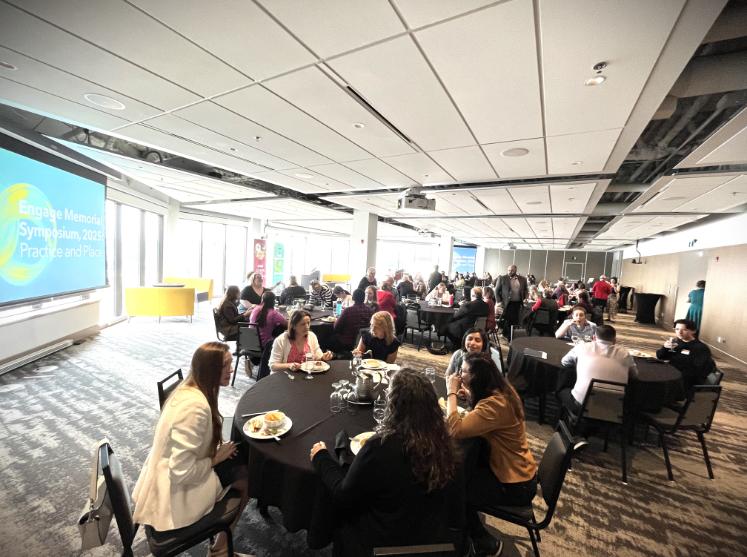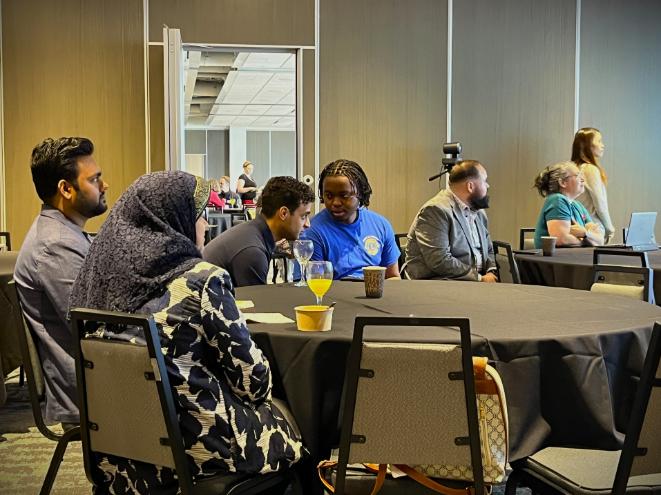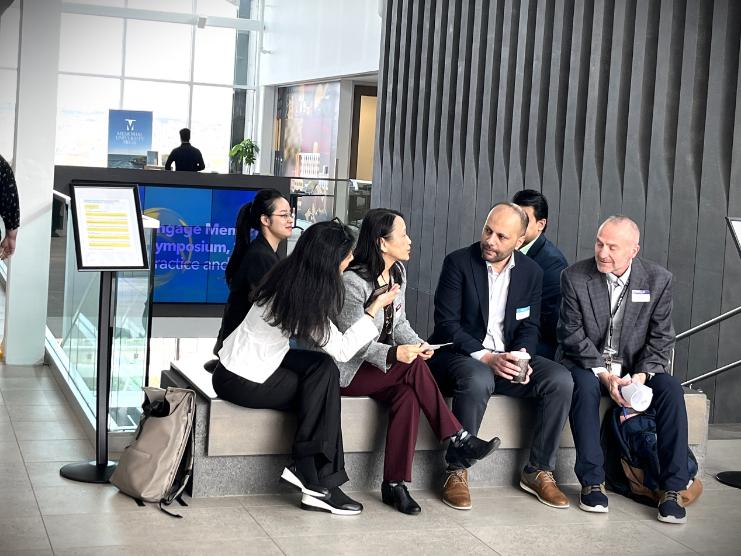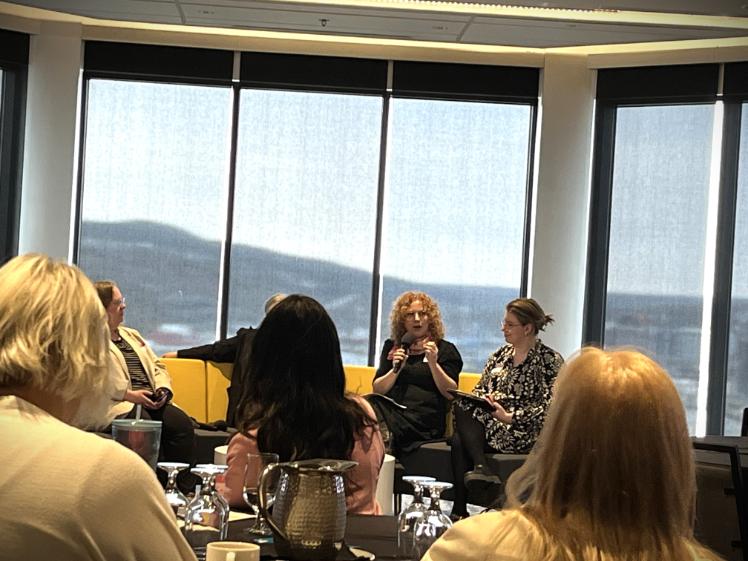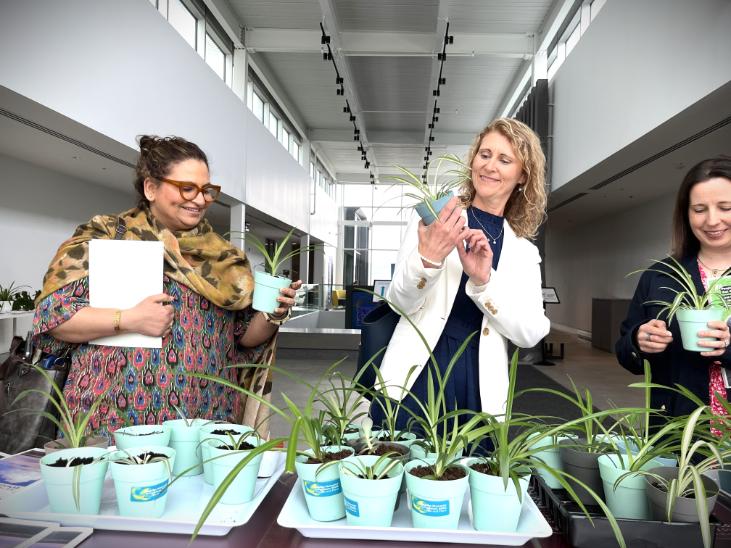Engage Memorial Symposium, 2025
Engage Memorial Symposium, 2025 Wrap-up Report
A note from the organizers:
When we set out to organize a pan-university public engagement symposium, we knew we were tapping into a deep well of expertise and experience. Proposals came in from across Memorial’s campuses and a wide range of faculties and disciplines. Students, faculty, staff, and community partners were eager to share lessons learned through meaningful, engaged partnerships.
We also reached out to national peers—organizations committed to helping research make a real difference in communities and regions.
Now that the event is behind us, we’re even more impressed by the richness of public engagement knowledge at Memorial and among our partners, and grateful for the openness to building stronger relationships—between university and community, and within Memorial’s own engagement network. And for that, we’d like to thank all of our participants- presenters, chairs, volunteers, and attendees- for your contributions. We’re excited to carry that energy forward.
Sincerely,
The Office of Public Engagement Team (Penny Cofield, Rebecca Cohoe and Andreae Callanan)
Reflections from Participants:
We asked several people who attended the in-person event to share their experiences and reflections about Engage Memorial Symposium, 2025.
"As a Folklore PhD candidate, I believe in multi-level human engagement and interactions that truly inspire our academic journey to contribute to the community.
This engagement symposium was a great platform for me to showcase my research to a large interdisciplinary audience whose research ideas also shaped my thoughts in different ways. The new perspectives about community belonging, researcher responsibilities and researcher-participant relationships are some of the key takeaways for me from this symposium.
While living in St. John's, it is hard for a graduate student like me to afford travels to multi-disciplinary conferences and therefore this engagement symposium was true to its title "engagement" where researchers from different disciplinary backgrounds and community partners came together to share thoughts and lived experiences, important to discuss in academia."
Israt Jahan Lipa, PhD Student in the Department of Folklore
"I greatly enjoyed the Engagement Symposium at Signal Hill. It was great to hear what fellow researchers at Memorial were doing in terms of community engagement and knowledge mobilization.
It was especially interesting to learn from colleagues at the Labrador campus about community initiatives in farming and sports connected with MUN. As a new arrival to Corner Brook and Newfoundland in early 2025, the conference was also an excellent opportunity for me to meet researchers working on parallel projects - it was definitely time well spent!
Lastly, the final "instant choir" was also a memorable, and very fun experience - I have been thinking I may bring something similar into a future conference I am involved with. Thanks for organizing the conference. I look forward to events in the future and staying connected with fellow researchers I met in St John's."
Max Cohen, Research Associate at Grenfell Campus
Symposium Overview
Engage Memorial Symposium, 2025 took place over two days, May 28th and 29th. The first day began at one with an introduction from Dr. Peter Ride, Dean of the School of Fine Arts at Grenfell Campus, and the host of Engage Memorial Symposium. Lisa Browne, the Vice President (Administration, Finance and Advancement) offered greetings.
The rest of the afternoon’s agenda focused on knowledge mobilization, beginning with a panel that explored the intersections between public engagement and knowledge mobilization. Michael Johnny of Research Impact Canada hosted a discussion between Dr. Sevtap Savas, Rochelle Baker, Sarah Worthman, and Krista Jensen (also from Research Impact Canada). After that, the group split for workshops sessions, one about using clear communications in research, the other about quantifying the impact of engaged research over time.
Dr. Ted Hewitt, President of the Social Sciences and Humanities Research Council shared a keynote address that evening, asking the question “what do universities owe the public?” He was joined for a panel discussion by Dr. Barbara Neis (Dr. Chief Mi’sel Joe was unable to join as scheduled.) The discussion was moderated by CBC NL’s Adam Walsh and offered a timely and candid look at the role of universities in the communities and regions that they serve.
The nextday began bright and early, with a performance of excerpts from Blackout, a musical about the experiences of queer, neurodivergent high school students, created as part of a collaboration between Courtney Fowler School of Performance, and Memorial researchers. Special thanks to youth performers Berry Fowler, Genevive Froom and Kohen Pickett-Hackett!
Then the concurrent sessions began, including presentations, panels, workshops and story swaps. There were presenters from all of Memorial's NL campuses, representing a broad range of disciplines and faculties. The organizers also included a small surprise mid-afternoon- an instant choir, courtesy of Growing the Voices, and led by Julia Halfyard and Peter Halley. It was (mostly) a hit!
The afternoon, and Symposium, wrapped up just after 3:00, with reflections by our host, Dr. Peter Ride, and thanks from the Office of Public Engagement.
Agenda Schedule(including concurrent session titles.)
Keynote Address Video:
As higher education across Canada faces a range of big challenges, Memorial University's Office of Public Engagement asked panelists to consider an important question: “what do universities owe the public?”
This session, moderated by CBC NL’s Adam Walsh, explores key questions, including: what is the role of universities in an era of rising polarization? How do we best serve our communities? What does Canada’s publicly funded post-secondary sector owe to the public, and to itself?
The session features a keynote address by Dr. Ted Hewitt of the Social Sciences and Humanities Research Council, and a panel with Dr. Hewitt and Dr. Barbara Neis, Professor Emerita, and Honorary Research Professor with Memorial’s department of Sociology (Dr. Chief Mi’sel Joe, Traditional Saqamaw and Newfoundland District Chief for the Mi’kmaq Grand Council participated in the planning of the session, but was unable to attend the taping on the day of.)
Along with some love for the warm cookies served at the afternoon break on day one, the attendee survey from Engage Memorial Symposium 2025 provided plenty of good insight to help guide future planning.
Beyond the cookies, attendees appreciated many aspects of the event: meaningful in-person conversations about publicly engaged research, connecting with researchers from other campuses, and the impromptu choir (although one person could have done without the surprise singing!)
Highlights for respondents included:
"Getting the chance to learn about the amazing engagement work happening at Memorial campuses outside of St. John's."
"Evening session was excellent. Barb Neis's blunt commentary was needed and a joy to hear!"
"Having conversations with other professionals doing community-engaged work"
"The sessions were very well selected, including the presenters."
Several suggested improvements for next time, with the most common theme being disappointment about having to choose between concurrent sessions (“I felt so sad missing some of the cool ones,” one respondent shared). The survey also suggested that some disciplines were more strongly represented than others, and that representation from diverse groups is essential to conversations about public engagement.
"I found it quite odd that there wasn't clearly breadth in the disciplines of the speakers invited to the panels, and to give workshops. It was very very health-focused outside of the Keynote by the president of SSHRC."
Some also expressed a desire for more participation from community and public partners.
“Invite the public we’re all supposed to be engaging with!”
" Find ways to encourage more attendance and participation from students and community partners outside of Memorial."
The decision to focus mostly on Memorial participants was considered carefully in planning. For this event, there was a focus on providing professional development for Memorial students, faculty, and staff, and on strengthening internal connections—key priorities from our recent Public Engagement Renewal process.
The organizing group was mindful that some content that would be useful to a Memorial audience, might not be relevant to public partners, whose time we deeply respect. All presenting community and public partners were invited to attend the full event, and received honorariums.
While this approach felt right for this first year, OPE is committed to creating more opportunities for meaningful public involvement at future symposia. We’ll also continue supporting the strong public-facing work already happening across Memorial’s engagement units, and will help make sure that Memorial students, faculty and staff understand how to access these opportunities.
If you're interested in digging into our survey results a bit more you can view this AI Generated Survey Results Overview.
So, what comes next?
Now that the Symposium is over, what is next for public engagement at Memorial? Given the range and breadth of public engagement activitiy happening across Memorial, that isn't a question that we can answer on our own!
As we move into the Summer, the Office of Public Engagement is preparing to bring the renewed Public Engagement Framework to Memorial's Academic Senate and the Board of Regents. The Public Engagement Framework is Memorial's pan-university strategy for public engagement, providing a vision, principles, goals and priorities for the way that Memorial does public engagement. You can learn more about the Public Engagement Framework. and the recent renewal process, here.
We'll also be launching our funding programs 2025-2026. The opening and closing dates for all programs are available here.
If you're interested in having a better sense of the big picture of public engagement at Memorial, we suggest that you take a look at the Public Engagement Practitioners' Network. We're always welcoming new members, from Memorial and the public.
There is also the Public Engagement Supports Community of Practice, that brings together Memorial whose mandates specificallly include public engagement supports.
If you're interested in being part of either group, please email us at engagement@mun.ca.
In closing, we'd like to offer our thanks to everyone involved in the Symposium! We have such a strong public engagement ecosystem at Memorial. If you've got ideas, thoughts or concerns related to public engagement here, we are always interested in hearing them. Please reach out!
